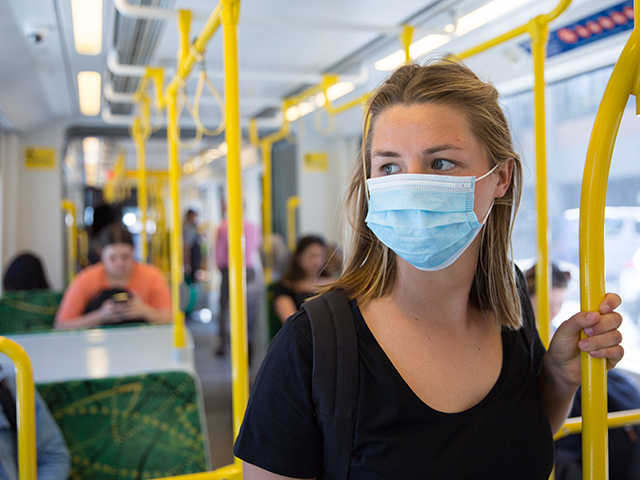A vast majority of Americans remain “confident” they are protecting themselves from the Chinese coronavirus by wearing masks, a Gallup survey found. The findings precede a Danish study that cast doubt on the efficacy of surgical masks and comes as experts emphasize the importance of social distancing.
“Which of the following are reasons why you feel confident you are able to protect yourself in public?” the survey asked.
Respondents overwhelmingly chose “you wear a mask in public” as the number one reason they feel confident, followed by 51 percent who said, “Other people wear masks when in public.”
Social distancing, which some experts have identified as more efficient in preventing the transmission of the virus than wearing surgical or cotton masks, came in third, with 49 percent choosing the option.
Thirty-six percent said they remained confident in protecting themselves from the virus because they are “personally healthy,” and one-third said, “Other people do a good job following public health measures.”
Thirteen percent noted that individuals in their age group do not usually face “serious health effects” from the virus, and eight percent indicated that they do not need to take special precautions “because it is difficult to catch the coronavirus.”
The Gallup survey, conducted November 1-6 as “part of the Franklin Templeton-Gallup Economics of Recovery Study,” surveyed 5,026 adults.
Last month, a DANMASK-19 study, published in the Annals of Internal Medicine, found that there was no statistically significant difference in infection rates among surgical mask wearers and non-surgical mask wearers.
It found:
Our results suggest that the recommendation to wear a surgical mask when outside the home among others did not reduce, at conventional levels of statistical significance, the incidence of SARS-CoV-2 infection in mask wearers in a setting where social distancing and other public health measures were in effect, mask recommendations were not among those measures, and community use of masks was uncommon. Yet, the findings were inconclusive and cannot definitively exclude a 46% reduction to a 23% increase in infection of mask wearers in such a setting. It is important to emphasize that this trial did not address the effects of masks as source control or as protection in settings where social distancing and other public health measures are not in effect.
…
A total of 3030 participants were randomly assigned to the recommendation to wear masks, and 2994 were assigned to control; 4862 completed the study. Infection with SARS-CoV-2 occurred in 42 participants recommended masks (1.8%) and 53 control participants (2.1%). The between-group difference was −0.3 percentage point (95% CI, −1.2 to 0.4 percentage point; P = 0.38) (odds ratio, 0.82 [CI, 0.54 to 1.23]; P = 0.33). Multiple imputation accounting for loss to follow-up yielded similar results. Although the difference observed was not statistically significant, the 95% CIs are compatible with a 46% reduction to a 23% increase in infection.
A July update from the UC Davis Health experts also stressed that social distancing is more effective at cutting transmission rates than masks, though they did say mask-wearing had a positive effect as well.
“So we don’t know who might spread it,” Dean Blumberg, chief of pediatric infectious diseases at UC Davis Children’s Hospital, said. “We do know social distancing reduces the risk of transmitting the virus by 90 percent and wearing masks decreases the risk by 65 percent.”

COMMENTS
Please let us know if you're having issues with commenting.